Results
-
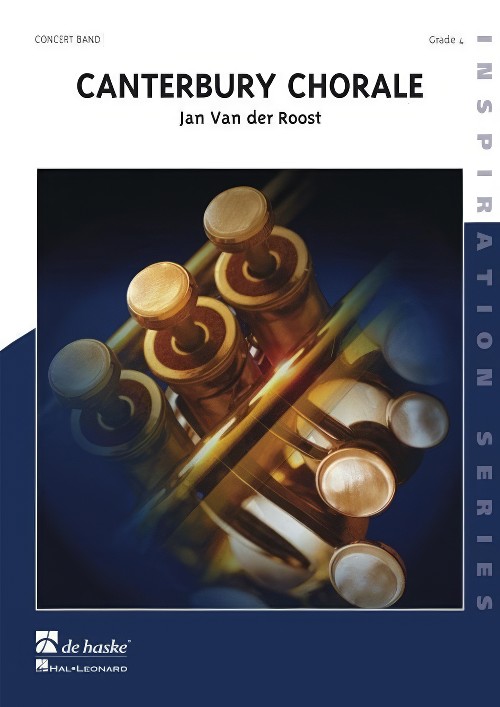 £104.99
£104.99Canterbury Chorale (Concert Band - Score and Parts) - Van der Roost, Jan
This quiet piece with its broad tones was originally written for brass band on request of Robert Leveugle, chairman of the composers own band: Brass Band Midden Brabant (Belgium). The direct cause was a visit to the beautiful cathedral of the English city Canterbury, in which so many fine compositions sounded throughout the centuries. Later on, Jan Van der Roost rescored this piece for symphonic wind band, exploring the full richness of colours of this formation. Besides solo phrases for several instruments, there are some massive tutti passages making the wind orchestra sound like a majestic organ. By the way: an "ad libitum" organ part adds an extra richness, colour and power to this piece, making it sound even more broad and grand.Duration: 6:30
Estimated dispatch 7-14 working days
-
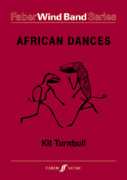 £65.00
£65.00African Dances (Clarinet Solo with Concert Band - Score and Parts) - Turnbull, Kit
African Dances' is a continuous work for solo clarinet and wind ensemble consisting of five individual sections. The basis for the piece is the clarinet's construction from the wood of the African blackwood tree, and its subsequent development into the instrument we know today. Each movement draws on different aspects of Pan-African music, ranging from the styles and forms of the African choral tradition, through to the complex cross-rhythms and patterns that characterise so much of the music of Africa.Duration: 12.00Recorded on Polyphonic QPRM137D LINDA MERRICK - CLARINET (Royal Northern College of Wind Orchestra)
Estimated dispatch 7-14 working days
-
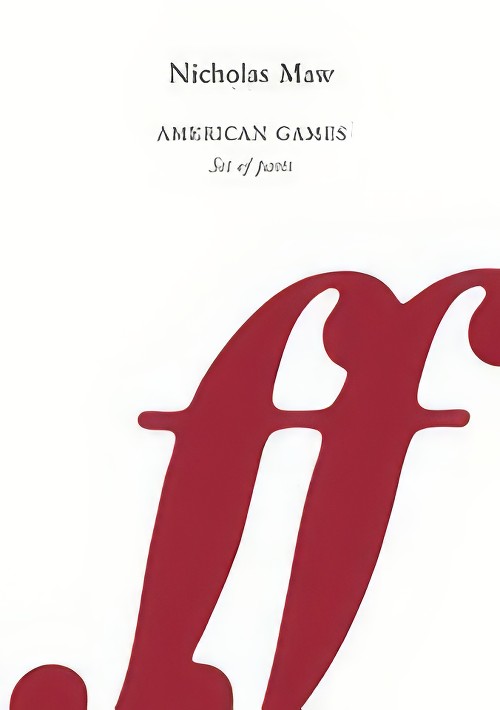 £125.00
£125.00American Games (Concert Band - Score and Parts) - Maw, Nicholas
If Nicholas Maw is best known as a master of expansive, often melancholy, musical statements, his riveting American Games for symphonic wind band displays a different side of his fascinating output. Unfolding as one continuous span, this driving, dynamic 7-movement work is filled with rhythmic zest and a sophisticated feeling for colour. Commissioned for the 1991 BBC Proms, the work was first performed there by the Royal Northern College of Music Wind Orchestra.
Estimated dispatch 7-14 working days
-
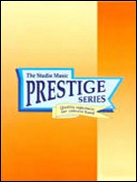 £21.95
£21.95CANTICLE OF THE SUN (Prestige Concert Band) (Percussion Solo/Concert Band Extra Score) - Ellerby, Martin
Extra Score. This work for solo percussion and concert band was commissioned by Birmingham Symphonic Winds - conductor Keith Allen, for Simone Rebello. The work is based on the canticle written by St. Francis of Assisi. Lines from this work form sub-titles and contrasting sections, all of which should be performed without breaks. (Soloist - Grade 6 Band - Grade 5). Performance time c. 12 minutes. Recorded on QPRM152D MOSAIC: Great British Music for Wind Band Vol.13 (Royal Northern College of Music Wind Orchestra)
Estimated dispatch 7-14 working days
-
 £107.95
£107.95CANTICLE OF THE SUN (Prestige Concert Band) (Percussion Solo/Concert Band) - Ellerby, Martin
This work for solo percussion and concert band was commissioned by Birmingham Symphonic Winds - conductor Keith Allen, for Simone Rebello. The work is based on the canticle written by St. Francis of Assisi. Lines from this work form sub-titles and contrasting sections, all of which should be performed without breaks. (Soloist - Grade 6 Band - Grade 5). Performance time c. 12 minutes. Recorded on QPRM152D MOSAIC: Great British Music for Wind Band Vol.13 (Royal Northern College of Music Wind Orchestra)
Estimated dispatch 7-14 working days
-
 £37.95
£37.95CHIVALRY (Prestige Concert Band - Score only) - Ellerby, Martin
This 'Symphonic Tone Poem for Brass, Wind and Percussion' was commissioned by Philip Biggs and Richard Franklin for the 2003 All England Masters Brass Band Championship. The work transfers well to the concert band and is already being featured around the world. It is based on two principle themes of love and war which compete against each other in what can be broadly described as a cinematic structure.Performance time 14'05"Recorded on QPRM 150D CHIVALRY, Royal Northern College of Music Wind Orchestra
Estimated dispatch 7-14 working days
-
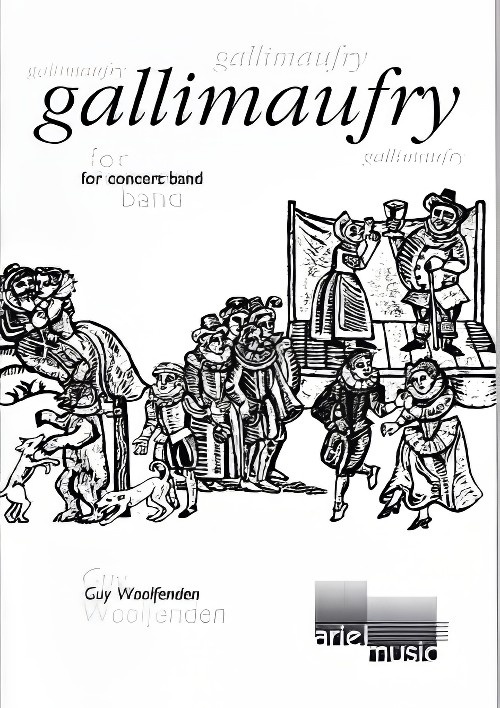 £140.00
£140.00GALLIMAUFRY (Concert Band) - Woolfenden, Guy
Gallimaufry (gali maw'fri): A medley; any confused jumble of things; but strictly speaking, a hotch potch made up of all the scraps of the larder. cf Shakespeare: The Winter's Tale: "a gallimaufry of gambols"I. Church and StateII. Inn and OutIII. Starts and FitsIV. Father and SonV. Advance and RetreatVI. Church and Status QuoGallimaufry was inspired by Shakespeare's Henry IV plays, and derives from music I composed for the Royal Shakespeare Company's production which opened the Barbican Theatre in 1982. The score is dedicated to Trevor Nunn, then Artistic Director of the RSC, with grateful thanks for his suggestion that I should expand and mould the music from these productions into a form suitable for concert performance.My thanks also to Timothy Reynish and the British Association of Symphonic Bands and Wind Ensembles who, with funds provided by North West Arts, commissioned the work and helped to ensure its first performance on September 24th 1983 with the Royal Northern College of Music Wind Orchestra.The work is continuous and the thematic material of each of the six sections closely related. The "establishment" - leadership, temporal and ecclesiastical power - are depicted in the stately march which opens the work. (Church and State)The second section, Inn and Out, in an energetic hemiola rhythm, is concerned with the stews and low-life revels at the Boar's Head Tavern. This is interrupted and finally integrated with the Tavern Brawl and Gadshill Ambush of Starts and Fits.The mood changes and the ambivalence of Prince Hal's relationship with his father and surrogate father, Falstaff, is portrayed in a serene cor anglais solo. (Father and Son)Advance and Retreat is a recruiting march, derived from the Tavern Tune and leads into the last movement, Church and Status Quo, which deals with the rejection of Falstaff and the crowning of Price Hal. Order is restored with a majestic affirmation of the opening material.
Estimated dispatch 7-14 working days
-
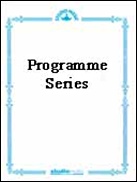 £74.95
£74.95H.M.S. CHARITY (Concert March) (Programme Concert Band) - Ellerby, Martin
Recorded on Polyphonic QPRM155D Scenes from Childhood (Great British Music for Wind Band Vol.15), Royal Northern College of Music Wind Orchestra
Estimated dispatch 7-14 working days
-
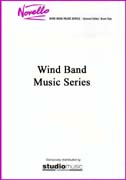 £214.95
£214.95JOURNEY THROUGH A JAPANESE LANDSCAPE (Percussion Solo with Concert Band - Score and Parts) - Musgrave, Thea
Concerto for Solo Marimba and Wind Orchestra. The four movements of Journey through a Japanese Landscape are based on a series of haiku which represents an emotional journey through the four seasons. The three haiku chosen for each of the seasons provide a setting and an event; thus, the gently undulating spring sea is the background for the free, improvisatory character of the skylark. The summer grasses have buried the glorious dreams of ancient warriors and after a violent storm, a distant memory of a march is heard. An autumnal fog envelops a colossal Buddha and a lonely watcher sounds one gong after another while a cricket acts as a grave keeper. Glass wind chimes introduce the frozen winter landscape. The march returns, then sleet and snow build to a big storm. Out of the silence that follows, echoes of the first movement suggest the return of spring and so, rebirth. (Grade 4) Duration: 23:00
Estimated dispatch 7-14 working days
-
 £49.95
£49.95JOURNEY THROUGH A JAPANESE LANDSCAPE (Percussion Solo with Concert Band - Score only) - Musgrave, Thea
Concerto for Solo Marimba and Wind Orchestra. The four movements of Journey through a Japanese Landscape are based on a series of haiku which represents an emotional journey through the four seasons. The three haiku chosen for each of the seasons provide a setting and an event; thus, the gently undulating spring sea is the background for the free, improvisatory character of the skylark. The summer grasses have buried the glorious dreams of ancient warriors and after a violent storm, a distant memory of a march is heard. An autumnal fog envelops a colossal Buddha and a lonely watcher sounds one gong after another while a cricket acts as a grave keeper. Glass wind chimes introduce the frozen winter landscape. The march returns, then sleet and snow build to a big storm. Out of the silence that follows, echoes of the first movement suggest the return of spring and so, rebirth. (Grade 4) Duration: 23:00
Estimated dispatch 7-14 working days
